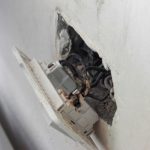What Are the Causes of Circuit Breaker Overheating?
Your home’s circuit breakers in its electrical panel are a safety feature designed to reduce your home’s risk of electrical fires. Any electricity that gets used in your home flows through these breakers, each of which carefully monitors operating temperature of the circuit and electrical system. If the temperature gets too high, the breaker shuts off.
If you feel your circuit breakers and sense a little warmth, this is completely normal; however, there’s a difference between warm and hot, and a breaker should never feel hot. If the breaker is still getting hot despite being wired and connected correctly, the breaker itself may be bad. Signs that would indicate this include lights on the circuit flickering or the breaker not tripping in such circumstances.
What results in the breaker getting to this point?
If there are any loose connection points in your electrical panel, this will increase electrical resistance and result in greater heat generation. Overheated breakers are often loose and need to be tightened. They must be properly seated on the clip that holds them to the bus bar behind.
You can tell if a breaker isn’t seated properly by a quick visual inspection. If one end is slightly protruding out farther than the other, it’s not fully connected. Push down on that end until the breaker audibly clicks into the seating.
If, however, the breaker is properly seated, then the problem could be the wire connection. If this is the case, you’ll need to pull out the breaker and tighten the lug that keeps the breaker in place with a screwdriver.
This is a task that’s best left up to an electrical professional because of the dangers associated with it and the potential that something could go wrong.
For people who do attempt a DIY fix, it is crucial to remember the hot bus is always energized, even if you have power to the main breaker turned off. This means you should wear rubber-soled shoes and rubber gloves and only use tools that have insulated handles. Again, it’s always better to call in a professional than to take on a job you’re not completely comfortable with or qualified for.
While those are far and away the most common causes of circuit breaker overheating, there are a couple other potential causes to consider if you’ve ruled those out.
There’s a possibility the current that passes through the breaker could have reached its limit. If it exceeds its limit, the circuit breaker should switch off—but even if the current is just below that limit, it could still get pretty hot, especially if the appliance being powered by the breaker is consuming a lot of energy.
The breaker itself could also be bad, especially if you notice flickering lights or power going in and out. In such a case, you will need to replace the breaker with a new one.
For more tips and information about circuit breaker repair and what to do when you have a circuit breaker overheating, contact us at JB Electric LLC.
More...
Categorised in: Electrical Issues




